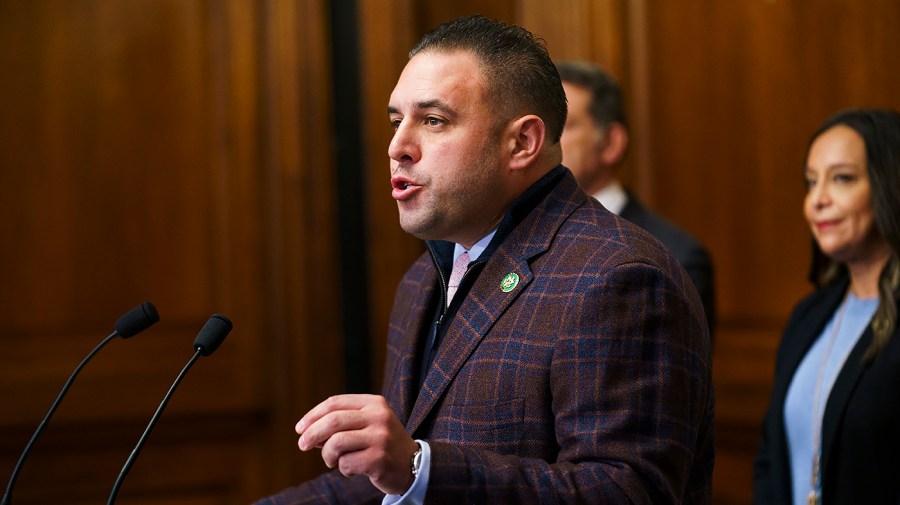Speaker saga takeaways: Why Mike Johnson won and his coming challenges
The stunning rise of newly minted Speaker Mike Johnson (R-La.) marks the end of weeks of chaos in the House and the Republican Conference.
After bitter and personal battles sank three other Speaker options, House Republicans found Johnson to be the conservative constitutionalist with a dash of Southern charm that they needed to end the turmoil at the right time — giving him unanimous GOP support.
But even though the biggest intraparty crisis is over, the House and Republicans face immediate challenges over government spending, as well as wartime aid to Israel and Ukraine.
Here are six takeaways from the Speaker saga and what comes next.
Johnson makes meteoric rise from obscurity

Johnson’s ascension to the Speakership represents a meteoric rise for the Louisiana Republican, catapulting him from relative obscurity to an office that is second in line to the presidency.
Johnson, who first came to the House in 2017, was serving his second stint as vice chair of the House Republican Conference when he won the Speaker’s gavel. The mild-mannered lawmaker has remained largely under the radar throughout his congressional tenure, focusing on his work with the House Judiciary and House Armed Services committees.
One of Johnson’s first tests as Speaker will be leading the GOP conference and working with the Senate to avert a government shutdown by next month’s deadline. But in a sign of his low-profile nature, some senators said Wednesday they know very little about the new Speaker.
“I don’t know him at all,” Sen. Mike Rounds (R-S.D.) said. “I heard his name, really, for the first time this week.”
Exhaustion helped seal the deal

After three weeks of the Speaker stalemate and four different candidates for the top job, House Republicans were fatigued — a factor that very well may have contributed to GOP lawmakers unanimously falling behind Johnson, which is exceedingly rare for the fractious conference.
Rep. Ken Buck (R-Colo.) — who has been outspoken against efforts to overturn the results of the 2020 election and who opposed Jordan in part for his involvement — alluded to the exhaustion among House Republicans when asked about his decision to support Johnson despite his vote against certifying electors.
“Most of the conference voted to decertify, and I think it’s really important that we get a Speaker and that we move forward,” Buck told reporters ahead of the vote. “So I’m not electing someone I’m gonna marry; I’m not electing someone I’m gonna raise children with; I’m electing someone who’s gonna lead the conference.”
A conservative record and little baggage

For House Republicans, Johnson hit the sweet spot on conservative bona fides and a lack of policy or personal baggage that the three previous nominees could not muster.
He is a former chair of the Republican Study Committee, the largest conservative caucus in the House, and has a conservative voting record. Former President Trump, who had helped sink House Majority Whip Tom Emmer’s (R-Minn.) Speaker nomination out of a perceived lack of loyalty, had no problem with Johnson, who had led an amicus brief challenging 2020 election results in key states.
While the Speaker bids of Majority Leader Steve Scalise (R-La.) and House Judiciary Committee Chairman Jim Jordan (R-Ohio) sank in part because of personal beefs and grudges, Johnson inspired little enmity from his colleagues. In her nominating speech, House Republican Conference Chairwoman Elise Stefanik (R-N.Y.) called Johnson “a friend to all, an enemy to none.”
GOP divisions on government funding loom

Government funding runs out Nov. 17, renewing battles that have consumed the GOP conference for the whole year. McCarthy was ousted in part over his move to pass a “clean” stopgap proposal to fund the government until Nov. 17 and avert a shutdown.
Johnson has floated a stopgap measure into next year in order to avoid an omnibus package — but there are no guarantees that will go smoothly.
“It just depends on how it’s structured, framed, and whether it’s tactical versus a punt,” Rep. Chip Roy (R-Texas) said of a funding stopgap.
But he could have a bit of a honeymoon grace period.
“There was a trust factor with leadership last time,” House Freedom Caucus Chairman Scott Perry (R-Pa.) said. “You don’t blame the backup quarterback for the failures of the guy that just came out of the game.”
Ukraine aid remains a big question

The White House unveiled a roughly $100 billion emergency funding request last week, the majority of which — about $61 billion — would go toward supporting Ukraine as its war with Russia drags on.
How the House handles the supplemental request — especially the Ukraine portion — poses a tricky question for Johnson, as the House GOP conference becomes increasingly skeptical of sending more aid to Kyiv.
Johnson himself has a mixed record when it comes to support for Ukraine. He supported the Ukraine Democracy Defense Lend-Lease Act of 2022, but last month, he voted against sending $300 million in new aid to Ukraine. He also supported an amendment to the Defense appropriations bill last month that called for prohibiting security assistance for Ukraine.
More Republicans opposed sending the $300 million to Kyiv than those who supported it, a sign of the small appetite the House GOP conference has for Ukraine aid.
Johnson could affect GOP 2024 election prospects

A top role for the Speaker of the House is to be a major fundraiser for the party — and Johnson, who was far from a household name, comes into that role far from it. His committee raised $553,013 in the first six months of the year.
Johnson has also pledged to create a commission to examine the national debt — which could provide a pathway for Democratic campaign attacks if it veers into proposals about reforming entitlement programs such as Social Security and Medicare.
The new Speaker also has a staunchly anti-abortion record and a record opposing same-sex marriage, which could energize Democratic opposition.
But vulnerable Republicans, so far, are not expressing worries about Johnson’s social conservatism that might not mesh with their voters.
“He understands we come from districts that are perhaps more moderate. He wants to maintain those districts,” Rep. Anthony D’Esposito (R-N.Y.), who represents a swing district, said of Johnson.
Copyright 2023 Nexstar Media Inc. All rights reserved. This material may not be published, broadcast, rewritten, or redistributed. Regular the hill posts







